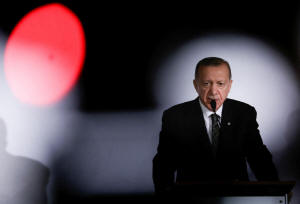Explainer-What's at stake in Turkey's upcoming elections
 Send a link to a friend
Send a link to a friend
 [January 18, 2023]
(Reuters) - President Tayyip Erdogan is aiming to extend
his 20-year rule in elections that will decide not just who leads Turkey
but how it is governed, where its economy is headed and what role it may
play to ease conflict in Ukraine and the Middle East. [January 18, 2023]
(Reuters) - President Tayyip Erdogan is aiming to extend
his 20-year rule in elections that will decide not just who leads Turkey
but how it is governed, where its economy is headed and what role it may
play to ease conflict in Ukraine and the Middle East.
The presidential and parliamentary elections, which must be held by
June, mark the biggest political challenge yet for Erdogan, who has
championed religious piety, military-backed diplomacy, and low interest
rates.
Should he lose, his opponents promise radical change.
WHAT'S AT STAKE IN THIS ELECTION FOR TURKEY...
The most powerful leader since Mustafa Kemal Ataturk founded the modern
Turkish republic a century ago, Erdogan and his Islamist-based AK Party
have shifted Turkey away from Ataturk's secular blueprint.
Erdogan has also centralised power around an executive presidency, based
in a 1,000-room palace on the edge of Ankara, which sets policy on
Turkey's economic, security, domestic and international affairs.
Critics say his government has muzzled dissent, eroded rights and
brought the judicial system under its sway - a charge denied by
officials who say it has protected citizens in the face of unique
security threats including a 2016 coup attempt.

Economists say his calls for low interest rates set inflation soaring to
a 24-year high of 85% last year, and the lira slumping to one tenth of
its value against the dollar over the last decade.
Opposition parties have pledged to restore central bank independence,
bring back parliamentary government and introduce a new constitution
enshrining the rule of law.
...AND THE REST OF THE WORLD?
Under Erdogan, Turkey has flexed military power in the Middle East and
beyond - launching four incursions into Syria, waging an offensive
against Kurdish militants inside Iraq and sending military support to
Libya and Azerbaijan.
Turkey also saw a series of diplomatic clashes with regional powers
Saudi Arabia, the United Arab Emirates and Israel, as well as a standoff
with Greece and Cyprus over eastern Mediterranean maritime boundaries,
until it changed tack two years ago and sought rapprochement with some
of its rivals.
Erdogan's purchase of Russian air defences triggered U.S. arms industry
sanctions against Ankara, while his closeness to President Vladimir
Putin led critics to question Turkey's commitment to the NATO Western
defence alliance. Ankara's objections to NATO membership applications
from Sweden and Finland have also raised tensions.
However, Turkey also brokered a deal for Ukrainian wheat exports,
underlining the potential role Erdogan has staked in efforts to end the
Ukraine war. It is not clear that a successor would enjoy the same
profile he has created on the world stage - a point he is likely to
stress in the election campaign.
COULD THE ECONOMY BRING ERDOGAN DOWN?
While the first of Erdogan's two decades in power was marked by surging
economic growth, the last 10 years have seen a decline in prosperity
which has hit his popularity with voters.
His AK Party is still the strongest party and likely remain a powerful
force in parliament, but opinion polls show Erdogan trailing against
some potential opposition presidential candidates.
[to top of second column]
|

Turkey's President Tayyip Erdogan
attends a news conference during the Informal EU 27 Summit and
Meeting within the European Political Community at Prague Castle in
Prague, Czech Republic, October 6, 2022. REUTERS/Leonhard Foeger

Knowing that the rising cost of living threatens his re-election
prospects, Erdogan has announced a doubling of the minimum wage in a
package of measures which will also allow more than 2 million
workers to retire early.
WHAT ARE THE OPPOSITION PROMISING?
The two main opposition parties, the secularist Republican People's
Party (CHP) and centre-right nationalist IYI Party, have allied
themselves with four smaller parties under a platform that would
reverse many of Erdogan's signature policies.
They have pledged to restore independence to the central bank and
reverse Erdogan's unorthodox economic policies. They would also
dismantle his executive presidency in favour of the previous
parliamentary system, and send back Syrian refugees.
Erdogan supported failed efforts to topple President Bashar
al-Assad, while hosting more than 3.6 million Syrian refugees who
have become increasingly unwelcome amid economic hardship in Turkey.
He has recently echoed opposition calls for rapprochement with
Damascus and talked about returning some refugees, although neither
the president nor opposition has set out how that could safely take
place.
WHAT'S STOPPING THE OPPOSITION?
The six-party alliance is seeking to forge a united platform but has
yet to agree a candidate to challenge Erdogan for the presidency.
CHP leader Kemal Kilicdaroglu is seen as a lacklustre campaigner.
Another contender, the CHP mayor of Istanbul, was handed a jail
sentence and political ban in December for insulting election
officials - a conviction he is challenging.
Meanwhile Turkey's top court is hearing a case to shut down the
third-largest parliamentary party, the pro-Kurdish Peoples'
Democratic Party (HDP), and has frozen some of its accounts. The HDP
former leader Selahattin Demirtas has been in jail since 2016 on
charges of insulting the president.
Once campaigning starts, opposition parties may find it harder to
get their message heard. In the 2018 presidential election they
struggled for air time on Turkish television channels which are
mostly strongly supportive of Erdogan.

WHAT HAPPENS NEXT?
Though the election deadline is mid-June, Erdogan's party has said
they may be brought forward.
The opposition alliance's choice of candidate could be key to their
chances of victory, but other factors will be in play including
prospects for reining in inflation.
Erdogan has floated the possibility of a summit with Syria's Assad,
a possible first step in discussions about the future of refugees.
At the same time, Ankara has warned for months that it is preparing
for a fresh offensive in northern Syria targeting Kurdish fighters -
which could boost Erdogan's ratings.
(Reporting by Dominic Evans; Editing by Jonathan Spicer and
Catherine Evans)
[© 2023 Thomson Reuters. All rights
reserved.]This material may not be published,
broadcast, rewritten or redistributed.
Thompson Reuters is solely responsible for this content. |